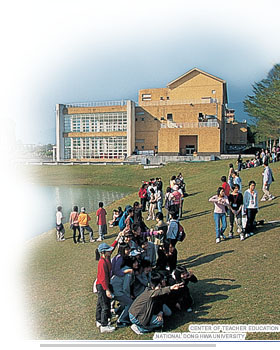Center Goals
National Dong Hwa University (NDHU), referred to as "the university," established the Teacher Education Center (referred to as "the center") in the 1998 academic year to launch secondary education programs. In the 2005 academic year, elementary education programs were introduced. Following the university’s spirit of "freedom," "democracy," "creativity," and "excellence," the center aims to cultivate professional, multi-perspective, and compassionate teachers for elementary and secondary schools. After merging with the former National Hualien University of Education in August 2008, the center became the only teacher education center in eastern Taiwan with four complete programs: secondary education, elementary education, early childhood education, and special education. By integrating the resources of NDHU’s various colleges, including science, management, humanities, indigenous studies, arts, marine sciences, and environmental studies, the center strives to develop educators with a broad general education perspective and professional excellence. The center also provides professional growth and in-service training programs for teachers in the eastern region. Additionally, the elementary education program offers the "Excellence Teacher Cultivation Scholarship," with 37 quotas funded by the Ministry of Education for the 2024 academic year. Each recipient receives a monthly stipend of NT$8,000 (approximately NT$400,000 over four years) to cultivate high-quality teachers.
Based on the university’s founding principles and the teacher training philosophy of elementary and secondary education programs, the center has four educational objectives:
- To cultivate professional and high-quality teachers;
- To cultivate teachers with diverse perspectives;
- To cultivate teachers who care for underprivileged groups;
- To cultivate teachers who embrace lifelong learning.
Under these objectives, teacher trainees in elementary and secondary education programs must possess five essential competencies:
- Developing both educational theory and practical application skills;
- Enhancing learner-centered teaching competencies;
- Strengthening adaptive curriculum design and diverse assessment competencies;
- Creating and managing a positive and caring learning environment;
- Deepening professional ethics and practical application skills.
1. Leveraging NDHU’s comprehensive resources to cultivate high-quality teachers
In response to the oversupply of teachers nationwide, the center has been actively expanding internal and external human resources since its establishment. After merging with the former National Hualien University of Education in the 2008 academic year, the center consolidated the resources of various NDHU colleges to offer comprehensive and high-quality teacher training programs. Admission, curriculum planning, and teaching for elementary and secondary education programs are collaboratively designed by experienced professors from within and outside the university, fostering long-term cooperation to cultivate high-quality teachers.
2. Developing refined teacher training programs to recruit outstanding students
With the declining birthrate affecting the teacher supply, the center follows the Ministry of Education’s policy to reduce teacher training quotas for elementary education programs since 2013. The center adopts strict selection criteria to recruit passionate and capable students, focusing on cultivating high-quality educators and enhancing their competitiveness in the job market.
3. Offering diverse courses and service-learning activities
Situated in Hualien, the center transforms geographical challenges into strengths by leveraging local resources to broaden the perspectives of teacher trainees. In addition to required professional education courses, the center offers elective courses emphasizing diversity, environmental education, gender education, human rights, and life education. Practical learning activities, including community service and education projects, further integrate theory with practice to nurture well-rounded educators.
4. Emphasizing teacher professional standards and digitalization
The center integrates digital technologies into teacher training, offering cloud-based systems for curriculum management and student learning. Platforms like "NDHU e-Learning" and "Teacher Education Data Management System" support effective teaching and learning experiences, enhancing the overall quality of teacher education.
5. Establishing the most comprehensive teacher education institution in eastern Taiwan
The center aims to become the core institution for educational research and teacher training in eastern Taiwan. Combining NDHU’s academic resources and the center’s elementary and secondary education programs, it provides a comprehensive training ground for educators with diverse specializations and multiple certifications.
The official name of the teacher education institution is "Teacher Education Center, National Dong Hwa University." The center director is Professor Pan Wen-Fu from the Faculty of Education. The center consists of five divisions, each responsible for specific tasks:
1. Elementary, Preschool, and Special Education Program Division
Responsible for recruitment, curriculum planning, learning management, and career guidance for teacher trainees in elementary, preschool, and special education programs.
2. Secondary Education Program Division
Handles recruitment, curriculum integration, and student management for secondary education programs.
3. Elementary, Preschool, and Special Education Internship Division
Organizes internships and practical training for elementary, preschool, and special education programs.
4. Secondary Education Internship Division
Manages internships and practical training for secondary education programs.
5. Local Education Support Division
Provides educational guidance and support for schools in the Hualien and Taitung regions, including organizing training and recruitment activities.

